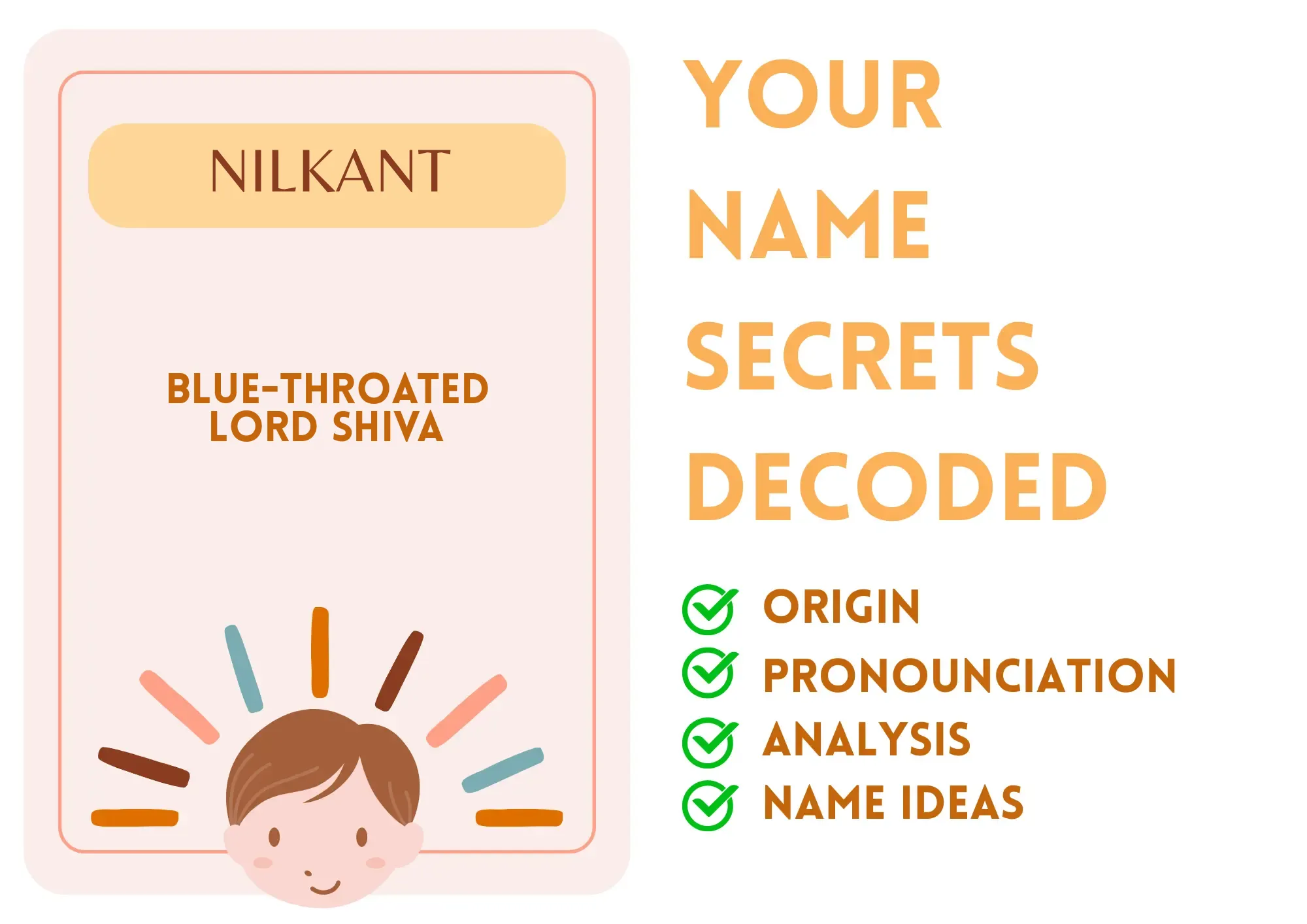
Nilkant
Nilkant is a compelling name with roots in Indian culture and mythology, meaning 'blue-throated.' This name is primarily associated with Lord Shiva, who is depicted as Nilkant after consuming poison to save the world, thus symbolizing self-sacrifice and protection. Nilkant is traditionally a male name within Hindu culture, though its rich meaning could appeal to a broader audience.
This name is revered for its spiritual implications, carrying a sense of strength and commitment. It is relatively straightforward to write and call, with a fluid pronunciation that is easy to remember. Common nicknames include Nil and Kantu.
In terms of popular culture, Nilkant reflects themes explored in various Indian mythological tales and is often associated with characters that embody strength, sacrifice, and resilience. Overall, Nilkant is seen favorably, encapsulating positive virtues in Indian philosophy.
Basic Information
Gender: Boy
Sounds Like: NEEL-kant
Pronunciation Explanation: The first syllable 'NEEL' rhymes with 'heel', and the second syllable 'kant' is pronounced like 'cant' in 'can't'.
Summary and Meaning
Meaning: blue-throated (Lord Shiva)
Origin: The name Nilkant has Indian origins, specifically linked to Hindu mythology and the Sanskrit language.
Usage: Nilkant is traditionally a masculine name, strongly associated with Lord Shiva and his attributes.
Name Number (Chaldean)
Name Number (Pythagorean)
Name Constellation (Nakshatra)
Name Zodiac Sign (Rashi)
Popularity (Global Rank)
Overall: 137484
Boys: 54235
Most Popular in
Religious and Cultural Significance
Religion: Hindu
Background: In Hindu culture, Nilkant is significant as it directly refers to Lord Shiva, who drank poison to save the cosmos, demonstrating profound sacrifice and protection.
Cultural Significance: Nilkant is a revered name due to its strong mythological connection and is often chosen for boys born into families with a deep respect for Hindu traditions and stories.
Historical Significance: Historically, Nilkant reflects a pivotal moment in Hindu mythology, where Lord Shiva's act of consuming poison during the churning of the ocean symbolizes sacrifice for the greater good, illustrating themes of courage and benevolence.
Popular Culture
Literature and Mythology: The name is often referenced in various texts and stories centered around Lord Shiva, contributing to its cultural weight.
Movies and Television: Nilkant has appeared as a character in various Indian dramas and adaptations of mythological tales, often portraying elements of strength and wisdom.
Feelings and Perceptions
Perception: Nilkant is generally viewed positively, with connotations of strength, nobility, and deep spiritual significance. It evokes respect and admiration in those familiar with its meaning.
Positive Feelings: Strong, noble, spiritual, protective, admirable.
Negative Feelings: Some may find it less familiar or challenging to pronounce at first.
Practical Considerations
Ease of Writing and Calling: Nilkant is easy to write with a clear phonetic structure. It consists of seven letters and is straightforward in pronunciation, resulting in an uncomplicated and elegant recall.
Common Typos and Misspellings: Nilkant,Nilkanth,Nilkand,Nilcat
Common Nicknames: Nil,Kantu,Nilo
Nilkant Popularity
Nilkant Usage and Popularity By Country
| Country | Rank (Overall) |
|---|---|
| Mauritius | 6749 |
| Oman | 12466 |
| Nepal | 13473 |
| India | 30790 |
| United Arab Emirates | 67985 |
| Australia | 68209 |
| Canada | 149654 |
| United Kingdom | 182431 |
| United States | 539518 |
Nilkant Usage and Popularity By City
| City | Rank (Overall) |
|---|---|
| Pune | 7309 |
| Bombay | 21390 |
| Nagpur | 3663 |
| North Goa | 2241 |
| Bengaluru | 34802 |
| Washim | 12217 |
| Gurgaon | 10094 |
Compatibility Analysis
Famous Persons Named Nilkant
No results found for Nilkant.
Related Names
Similar Sounding Names:
Nikhil,Nilay,Nilesh,Nira